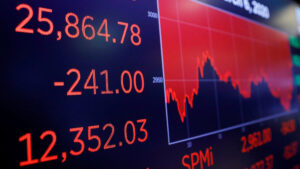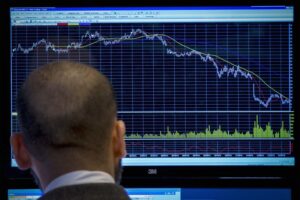
European stock indexes are down Thursday after the U.S. central bank’s decision to tighten monetary policy (monetary policy). Investors also expect interest rates to rise in the eurozone and are assessing issuers’ quarterly reports.
The Stoxx Europe 600 composite index of the region’s largest companies was down 0.52 percent at 460.1 points as of 11:55 a.m.
The British indicator FTSE 100 was losing 0.51% during the session, German DAX – 0.36%, French CAC 40 – 0.46%, Italian FTSE MIB – 0.71%, Spanish IBEX 35 – 0.58%.
The day before, the U.S. Federal Reserve (Fed) raised its interest rate on federal funds rate by 25 basis points, now its range is 5-5.25% per year. In addition, the words about the necessity of further tightening of MP, which were present in the document published at the end of the March meeting, disappeared from the press release on the results of the meeting.
The European Central Bank (ECB) is also likely to raise rates, Trading Economics said. The results of its May meeting will be published on Thursday at 15:15 Moscow time.
In addition, concerns about the banking sector are growing. PacWest Bancorp said it is in talks with partners and potential investors looking at different options for its business. Earlier, the media reported on the U.S. financier’s plans to sell the business, which triggered a more than 50% drop in its share price in Wednesday’s additional trading.
In France, shares of outsourcing Teleperformance (-4%), retailer Carrefour (-2.3%), cosmetics maker L’Oreal (-2.1%) and steelmaker ArcelorMittal (-1.7%) are among the leaders of the decline.
Papers of aerospace company Airbus SE fell in price by 1.1%. The European company in the first quarter recorded a 2% drop in revenue and net profit fell to 466 million euros from 1.22 billion euros a year earlier.
Shares of German Volkswagen AG fell 0.1%. The auto concern in the first quarter of 2023 significantly increased revenue, but reduced operating profit by 31%.
The capitalization of the Swedish Volvo Car falls by 3.8%. The company reported layoffs of 1,300 office workers in Sweden, or about 6% of its workforce in the country.
Another automaker, Bayerische Motoren Werke AG (SPB: BMW), is adding 2.2% in market value. The company approved a stock buyback of up to 2 billion euros, even though pre-tax earnings in the first quarter more than halved.
Mercedes-Benz Group AG common stock and Porsche Automobil Holding SE preferred stock added 2.4% and 1%, respectively.
Oil and gas company Shell (SPB: RDS.A) is up 2.3%. The British-Dutch company boosted its January-March net income by 22% year-over-year and plans to buy back its own shares for $4 billion before its second-quarter earnings release.
Shares of rival TotalEnergies (SPB: TOT) are up 1.3% and BP plc (SPB: BP) are down 0.4%.
Anheuser-Busch InBev (SPB: BUD) (AB InBev) brewery increased its net profit 17 times in the first quarter. Its market value is up 0.1%.

European stock markets are mostly moderately rising on Thursday after the release of corporate reports.
The Stoxx Europe 600 composite index of the region’s largest companies gained 0.2 percent to 464.12 points as of 12:05 p.m. ET.
France’s CAC 40 added 0.5% during the session. Spain’s IBEX 35, Germany’s DAX and Italy’s FTSE MIB gained 0.2%. The British FTSE 100 remains virtually unchanged.
Growth is being held back by economic uncertainty and renewed fears about the financial sector, says Trading Economics.
In addition, the composite index of business and consumer confidence in the euro area in April rose worse than expected, only 0.1 points compared with the revised result of March. Experts predicted the growth by 0,7 points.
Investors are also waiting today for preliminary data on US GDP in the first quarter.
Meanwhile, shares of European banks are rising on strong quarterly reports.
Deutsche Bank AG increased its net profit by 9% in the first quarter, which was better than analysts’ forecasts. Shares of Germany’s largest bank added 1.9%.
Capitalization of Spanish Banco Bilbao Vizcaya Argentaria SA is up 2%. BBVA reported a rise in net profit in January-March to 1.85 billion euros from 1.33 billion euros a year earlier. The figure beat analysts’ expectations.
The British Barclays raised pre-tax profit to 2.6 billion pounds ($3.24 billion) in the first quarter from 2.23 billion pounds a year earlier, beating the consensus forecast. The bank’s stock price is up 4.7 percent.
The market value of other members of the banking industry also increased, including Banco Santander – by 1.3%, BNP Paribas – 1.2%, Societe Generale – 0.9%, Credit Agricole – 0.8%, UniCredit – 2.4%, Intesa Sanpaolo – 1.3%.
Shares of British-Dutch Unilever rose 1.4%. One of the world’s leading suppliers of convenience goods increased revenue by 7% in the first quarter, a figure that beat the consensus forecast.
German energy company RWE AG said it expects adjusted EBITDA to almost double in the first quarter on better results from its international power generation business. The company, whose quarterly earnings will be released on May 11, is up 3%.
France’s TotalEnergies (SPB: TOT) boosted its net income by 12.4% in the first quarter and announced a dividend hike. Nevertheless, the oil and gas company’s stock quotes are losing 0.8%.
Shares of rival BP Plc (SPB: BP) and Shell (SPB: RDS.A) are down 0.6% and 0.4%, respectively.
The market value of France’s Pernod Ricard SA is down 0.4%. Alcohol producer increased its revenue for the first 9 months of the fiscal year by 13%, but its quarterly revenue decreased by 2%.

European stock indexes are down on Monday after the release of German economic confidence data and the first of many corporate reports this week.
The Stoxx Europe 600 composite index of the region’s largest companies lost 0.01% as of 12:33 p.m. and stood at 468.94 points.
France’s CAC 40 and Spain’s IBEX 35 were down 0.2%, Germany’s DAX and Britain’s FTSE 100 – 0.1%, Italy’s FTSE MIB – 0.9%.
On Friday all indicators, with the exception of the IBEX 35, were up.
Markets remain uncertain about the prospects for the global economy and fear further tightening of monetary policy, writes Trading Economics. In addition, investors this week expect the publication of performance indicators of banks Barclays, Santander, Deutsche Bank and UBS and giants of the consumer sector Nestle and Unilever.
Shares of the German software developer SAP go down in price by 1.3%. Also the leaders of reduction in Germany are shares of microprocessor manufacturer Infineon Technologies (-1%), stock exchange Deutsche Boerse (-1%), communications operator Deutsche Telekom (-0.9%), energy equipment manufacturer Siemens Energy (-0.9%) and energy company RWE (-0.8%).
In France, the market value of Vivendi media company declined by 1.9%, while cosmetics manufacturer L’Oreal – by 1.6%.
Oil companies followed the decline in oil prices, including TotalEnergies (SPB: TOT) down 0.4%, BP Plc (SPB: BP) – 0.7%, Shell (SPB: RDS.A) – 1%.
Endesa’s share price dropped 1.7% to €19.73. Analysts at RBC downgraded the fair value of the Spanish energy company to €19.5 from €20.
Meanwhile, the index of German business confidence in the country’s economy, calculated by the Ifo economic research institute, rose to 93.6 points in April from 93.3 points the previous month. This is the highest value since February 2022. The indicator has been rising for six months in a row. However, in April it failed to meet the expectations of analysts, who predicted an average increase to 94 points.
Shares of Swiss Credit Suisse are up 1.8%. The bank, which UBS agreed to buy, more than quadrupled its revenues in the first quarter and ended it with a net profit against a loss a year earlier.
Royal Philips NV of the Netherlands, which produces consumer goods and medical equipment, increased its net loss 4.4 times in January-March, but its sales and adjusted EBITDA exceeded experts’ forecasts. The company’s shares surged 11%.
The shares of the German Software AG rose by more than 49% on the news about the purchase of the software developer by the investment company Silver Lake for 2.2 billion euros. The estimate includes a 53% premium to the closing price level on April 20.
In addition, shares in the automotive sector go up: Mercedes-Benz Group up 0.9%, Bayerische Motoren Werke AG (SPB: BMW) up 0.8%, Stellantis up 2.6%, Renault up 0.4%, Continental up 1%, Michelin up 0.6%.
Banks are also rising, including BNP Paribas, up 1.1%; Credit Agricole, up 0.9%; Societe Generale, up 0.8%; Barclays, up 0.7%; Deutsche Bank, up 0.9%; and Unicredit, up 1.5%.

European stock indexes declined on Thursday for the second day in a row as investors assessed statistical data and company reports.
The Stoxx Europe 600 composite index of the region’s biggest companies was down 0.37% at 1:02 p.m., trading at 466.41 points.
The French CAC 40 was down 0.4% during the session, the British FTSE 100 – 0.2%, the German DAX – 0.7%, the Italian FTSE MIB – 0.9% and the Spanish IBEX 35 – 0.5%.
The index of business confidence in the French economy in April fell to 101 points from 104 points the previous month, said the national statistics office Insee. This is the lowest level in the last five months. The result was worse than analysts’ average forecast of 103 points.
Renault SA share price collapsed by more than 7%. The French carmaker boosted revenue in the first quarter by 30% year-over-year, while exceeding forecasts. However, the company said it continues to face logistical difficulties.
German carmakers are also down, including Porsche down 3.4%, Volkswagen down 2.8%, Bayerische Motoren Werke AG down 2.7% and Mercedes-Benz down 2.6%.
Stellantis shares dropped 5% on news of the unexpected resignation of its chief financial officer Richard Palmer, who will be replaced by Natalie Knight, according to Trading Economics.
In addition, securities of Pirelli & Co. and Ferrari are becoming cheaper – by 1.7% and 2.2%, respectively.
Britain’s Deliveroo Plc, a food delivery service operator, increased its revenue by 7% in the first quarter and confirmed its outlook for the current year. Nevertheless, the stock is down 0.6% as the number of orders and monthly number of active customers fell.
Finnish telecommunications equipment maker Nokia Corp. boosted revenue 9.6% in the first quarter, but net income was worse than the consensus forecast. The company’s market value is down 6.3 percent.
Autoliv, a Swedish-American maker of safety systems for cars, said it will build an airbag factory in Vietnam that will be operational by the end of 2025. The company’s stock is down 0.4%.
Following the fall in oil prices, securities of oil companies, including TotalEnergies – by 0.5%, BP Plc – 0.9%, Shell – 0.7%.
Meanwhile, the capitalization of the Swedish Volvo AB grows by 1.7%. In January-March, the car concern recorded a record for the first quarter deliveries of trucks and its order book grew by 32%.
Shares of French L’Oreal SA are up 0.3%. Growth in comparable sales of one of the world’s largest cosmetics manufacturers in the past quarter exceeded analysts’ expectations.
Italian oilfield services company Saipem SpA is up 2.1 percent, also thanks to good quarterly reports.

Western European stock indices were mostly on the rise on Monday thanks to a surge in shares of oil producers, which reacted to a jump in oil prices.
The Stoxx Europe 600 composite index of the largest companies in the region rose 0.1 percent to 458.31 points by 11:25 a.m.
The British FTSE 100 stock index was up 0.7%, the German DAX – less than 0.1%, the French CAC 40 – 0.3% and the Italian FTSE MIB – 0.4%. Meanwhile, Spain’s IBEX 35 lost 0.3%.
Oil rose more than 5% in trading after 8 out of 20 OPEC+ countries announced a voluntary reduction of oil production from May until the end of the year.
On the news, securities of leading oil industry players jumped in price, including BP Plc (4.4%), TotalEnergies (4.1%) and Shell (4%).
Meanwhile, on Monday it became known that the Purchasing Managers’ Index (PMI) in the euro area processing industry in March fell to 47.3 points from 48.5 points in February, renewing the lowest in four months. Preliminary data from S&P Global, which calculates the indicator, pointed to a drop to 47.1 points.
In Germany, industrial PMI slid to 44.7 points from 46.3 points, in France to 47.3 from 47.4 points and in Italy to 51.1 from 52 points. Meanwhile, in Spain, the indicator rose to 51.3 from 50.7 points.
Shares of UBS Group AG jumped by 4.1% on rumors that the Swiss bank was preparing to lay off 20-30% of its employees amid a merger with rival Credit Suisse. According to the sources of the newspaper SonntagsZeitung, the reduction could affect 25-36 thousand employees of the total staff of the bank, which after the merger will be about 120 thousand people.
The capitalization of the cinema chain Cineworld Group plummeted by 22.5% after the company stopped selling its assets in the United States, Britain and Ireland.
The price of Italian oilfield services company Saipem jumped by 5.5%, industrial Tenaris – by 4.2%, energy company Eni – by 3.9%.
Quotes of French banks BNP Paribas, Societe Generale and Credit Agricole grew by 1.1-1.7%.
The market value of Airbus increased by 1.3% and updated its maximum in five weeks.

Western European stock indexes are down sharply on Monday on the news about the bankruptcy of two banks in the U.S. and fears that the problems could spill over to the European banking industry.
The Stoxx Europe 600 composite index of the region’s largest companies fell 2.43% to 442.73 points by 11:25 a.m. The sub-index of the banking sector fell by almost 4%, writes Bloomberg.
The British FTSE 100 stock index was down 2.21%, the German DAX – 2.88%, the French CAC 40 – 2.59%. Italy’s FTSE MIB and Spain’s IBEX 35 lost 4.3% and 3.4%, respectively
As it was reported, the U.S. bank Silicon Valley Bank was taken over by the Federal Deposit Insurance Corporation (FDIC). The FDIC will sell Silicon Valley Bank’s assets, which will allow it to make payments on uninsured deposits. The bank’s bankruptcy was the largest since the 2008 financial crisis.
Regulators also shut down a smaller New York-based Signature Bank, which was popular with cryptocurrency holders.
The Federal Reserve (Fed) responded by announcing a new mechanism for providing funds to financial institutions to make sure they “have the ability to meet the needs of all their depositors.” The U.S. Treasury Department will allocate up to $25 billion from the stabilization fund to support the program.
The mechanism, called the Bank Term Funding Program (BTFP), provides loans of up to one year to banks, savings associations, credit unions and other financial institutions. The Fed would accept US Treasuries, federal agency bonds, mortgage bonds and a variety of other securities as collateral for these loans.
“Had it not been for regulatory support, the market would have opened much lower. However, many are selling stocks not because of a lack of confidence, but at the behest of risk management departments,” wrote Guillermo Hernandez Sampere, head of trading at MPPM GmbH. – We thought the system was more solid after (the bankruptcy – IF) of Lehman. We hope it will be a short-term storm, but it will not pass without consequences.”
Shares of Credit Suisse, the most troubled of Europe’s leading banks, fell nearly 10%, marking a new historic low. Commerzbank AG dropped 11.6%, making it the biggest loser on the Stoxx Europe 600 index.
HSBC Holdings Plc dropped 3.4% on the news that the bank is buying the British unit of Silicon Valley Bank for £1.
The key event for markets this week will be the release of February U.S. inflation data on Tuesday. Analysts polled by Trading Economics forecast that inflation in the U.S. slowed to 6% last month from 6.4% in January.
Sanofi (SPB: SNY) is down 1.4 percent. The French drugmaker reached an agreement to buy U.S. biopharmaceutical company Provention Bio Inc. for $2.9 billion.
Provention’s main asset is the drug TZIELD, the only U.S. regulatory-approved treatment designed to slow the onset of Stage 3 Type 1 diabetes.
The market value of Porsche AG drops 3.5 percent. The German luxury carmaker reported revenue growth of 13.6% last year, but the figure was worse than market forecasts.